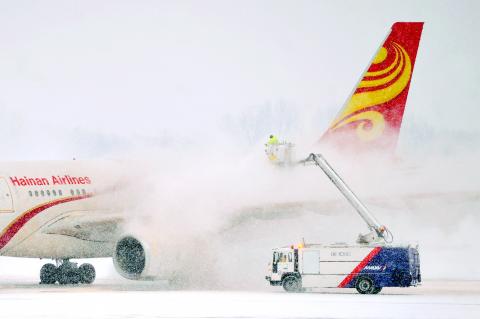Europe is willing to discuss its new carbon emissions tax for airlines with disgruntled governments, but has no plans to scrap the levy, a top EU official said yesterday.
“We’re ready to negotiate within our framework,” Siim Kallas, European Commission vice president and transport commissioner, said at an aviation conference in Singapore. “We aren’t trying to dominate the world.”
The EU imposed the tax, known as the emissions trading scheme, on Jan. 1 in a bid to curb emissions of climate-changing gases, but money will not be collected until next year. Under the system, airlines flying to or from Europe must obtain certificates for carbon dioxide emissions. They will get free credits to cover most flights this year, but must buy or trade for credits to cover the rest.

Photo: EPA
Airlines and governments have complained the tax is too costly and was implemented unilaterally by Europe. Industry leaders are warning the disagreement could spark a trade war between Europe and the rest of the world.
“I’m very worried,” said Tom Enders, CEO of Airbus, the world’s largest commercial airplane maker. “What started out as a solution for the environment has become a source of potential trade conflict.”
Last week, China barred its carriers from paying the charges or other fees without government permission, and Russia, India and the US have also voiced opposition.
Asian carriers say the carbon tax unfairly penalizes them because the charge is based on the distance of the flight.
Malaysian long-haul budget carrier AirAsia X said last month it plans to eliminate flights to Europe, in part because the carbon tax increased costs and made flights less profitable.
“The longer you fly direct, the more you’re penalized,” AirAsia X CEO Azran Osman-Rani said. “There was hope that the EU would back down, but they didn’t. Now they have to deal with China, good luck with that.”
The International Air Transport Association (IATA), which represents 240 airlines, is urging the EU to negotiate new carbon emissions guidelines through the International Civil Aviation Organization.
“Non-European governments see this extraterritorial tax collection as an attack on their sovereignty,” IATA CEO Tony Tyler said yesterday. “Aviation can ill afford to be caught in an escalating political or trade conflict.”
Tyler, who previously was CEO of Cathay Pacific Airways, reiterated IATA’s forecast that airline profits would likely fall to US$3.5 billion this year from US$6.9 billion last year as a slowing global economy and high fuel costs pinch earnings.
Kallas said the inability for governments to forge a global deal on reducing carbon emissions prompted the EU to act.
“The EU asked for years and years that there be a global solution on climate change,” Kallas said. “We’re protecting our citizens.”

WEAKER ACTIVITY: The sharpest deterioration was seen in the electronics and optical components sector, with the production index falling 13.2 points to 44.5 Taiwan’s manufacturing sector last month contracted for a second consecutive month, with the purchasing managers’ index (PMI) slipping to 48, reflecting ongoing caution over trade uncertainties, the Chung-Hua Institution for Economic Research (CIER, 中華經濟研究院) said yesterday. The decline reflects growing caution among companies amid uncertainty surrounding US tariffs, semiconductor duties and automotive import levies, and it is also likely linked to fading front-loading activity, CIER president Lien Hsien-ming (連賢明) said. “Some clients have started shifting orders to Southeast Asian countries where tariff regimes are already clear,” Lien told a news conference. Firms across the supply chain are also lowering stock levels to mitigate

Six Taiwanese companies, including contract chipmaker Taiwan Semiconductor Manufacturing Co (TSMC, 台積電), made the 2025 Fortune Global 500 list of the world’s largest firms by revenue. In a report published by New York-based Fortune magazine on Tuesday, Hon Hai Precision Industry Co (鴻海精密), also known as Foxconn Technology Group (富士康科技集團), ranked highest among Taiwanese firms, placing 28th with revenue of US$213.69 billion. Up 60 spots from last year, TSMC rose to No. 126 with US$90.16 billion in revenue, followed by Quanta Computer Inc (廣達) at 348th, Pegatron Corp (和碩) at 461st, CPC Corp, Taiwan (台灣中油) at 494th and Wistron Corp (緯創) at

IN THE AIR: While most companies said they were committed to North American operations, some added that production and costs would depend on the outcome of a US trade probe Leading local contract electronics makers Wistron Corp (緯創), Quanta Computer Inc (廣達), Inventec Corp (英業達) and Compal Electronics Inc (仁寶) are to maintain their North American expansion plans, despite Washington’s 20 percent tariff on Taiwanese goods. Wistron said it has long maintained a presence in the US, while distributing production across Taiwan, North America, Southeast Asia and Europe. The company is in talks with customers to align capacity with their site preferences, a company official told the Taipei Times by telephone on Friday. The company is still in talks with clients over who would bear the tariff costs, with the outcome pending further

NEGOTIATIONS: Semiconductors play an outsized role in Taiwan’s industrial and economic development and are a major driver of the Taiwan-US trade imbalance With US President Donald Trump threatening to impose tariffs on semiconductors, Taiwan is expected to face a significant challenge, as information and communications technology (ICT) products account for more than 70 percent of its exports to the US, Chung-Hua Institution for Economic Research (CIER, 中華經濟研究院) president Lien Hsien-ming (連賢明) said on Friday. Compared with other countries, semiconductors play a disproportionately large role in Taiwan’s industrial and economic development, Lien said. As the sixth-largest contributor to the US trade deficit, Taiwan recorded a US$73.9 billion trade surplus with the US last year — up from US$47.8 billion in 2023 — driven by strong